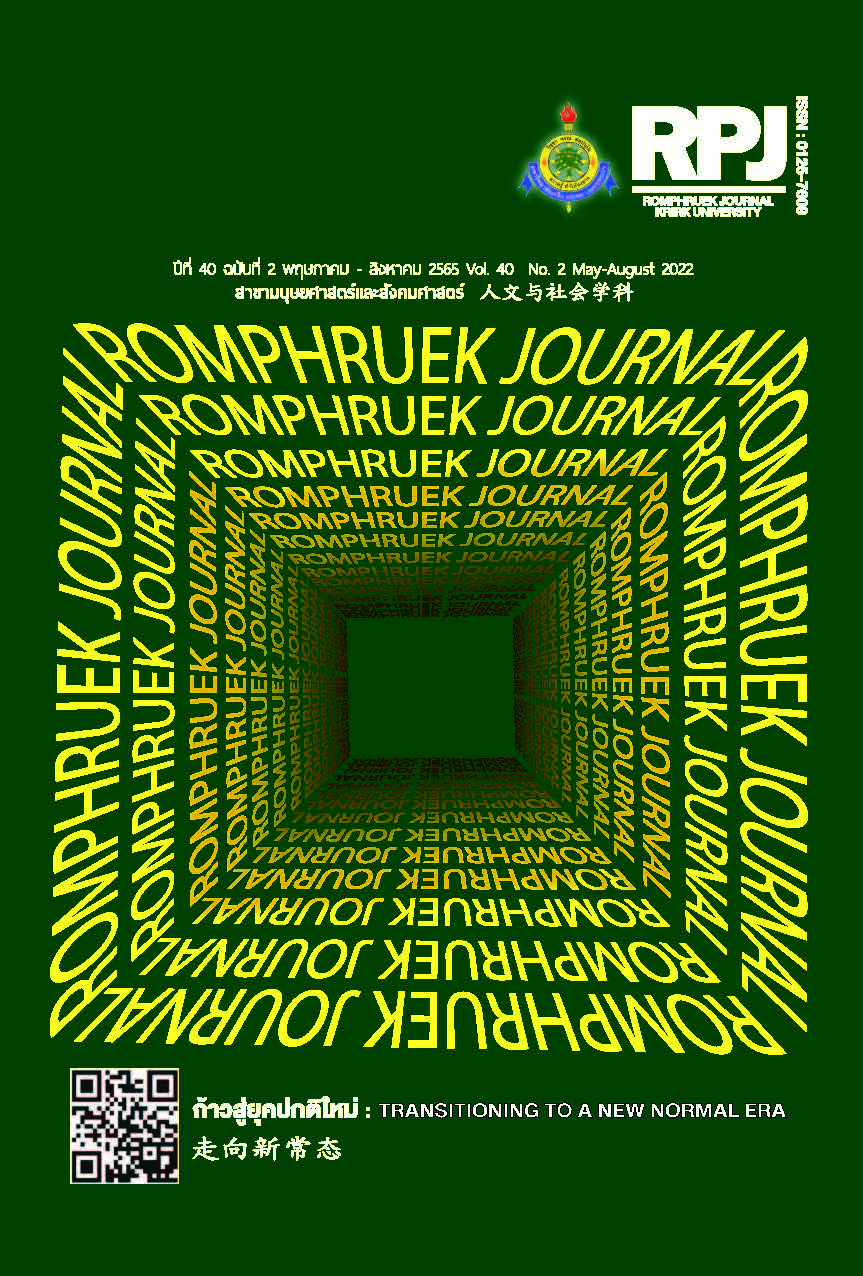Factors Tourism Marketing Mix under the Covid 19
Main Article Content
Abstract
The factors of tourism marketing mix under the COVID-19 crisis, which are considered important factors in traveling under the current COVID-19 crisis, this research objective were 1) to study the factors of tourism marketing mix under the COVID-19 crisis and 2) to Comparison of tourism marketing mix factors under the COVID-19 crisis Classifying personal factors of tourists and tourism behavior under the COVID-19 crisis. The collective data from a sample of Thai tourists traveling by using the criteria, the number of tourists who visited the top 5 in Thailand was 1) Bangkok, 2) Kanchanaburi Province, 3) Nakhon Ratchasima Province, 3) Chon Buri Province and 5) Chiang Mai Province 400 people, the method used in this research were questionnaires, statistical data analysis, frequency, mean, standard deviation, t-value, F-value, and LSD value, with the statistical significance level set of 05.
The results of the research showed that 1) tourism marketing mix factors Under the COVID-19 crisis, the results showed that travel marketing mix factors Under the COVID-19 crisis, the overall consensus was at the highest level. When considering each item in descending order of opinions, it was found that tourists had opinions. in the product field Process business cooperation with the mean at the highest level, respectively, and 2) tourists of different sexes, ages, and factors contributing to the tourism marketing mix under the COVID-19 crisis, in terms of product prices, through distribution channels, marketing promotion, personnel, process, business cooperation, product integration, and physical characteristics are different. and tourists with characteristics of travel, the purpose of travel, and cost per trip different, there is a combination of factors tourism marketing under the COVID-19 Crisis In terms of product prices, through distribution channels, under marketing promotion, under personnel, under process, under business cooperation, under the combination of products and their physical appearance are different.
Article Details

This work is licensed under a Creative Commons Attribution-NonCommercial-NoDerivatives 4.0 International License.
Every article published in the Romphruek Journal of the Humanities and Social Sciences is the opinion and point of view of the authors. Thery're not the viewpoint of Krirk University or the editored department. Any part or all of the articles for pablication must be clearly cited.
References
กรมการท่องเที่ยว. (2562). แผนยุทธศาสตร์พัฒนาการท่องเที่ยวพ.ศ. 2561 – 2564. (13 ธันวาคม 2563) สืบค้นจาก https://www.dot.go.th/storage.
กระทรวงการท่องเที่ยวและกีฬา. (2563). รายงานภาวะเศรษฐกิจการท่องเที่ยว ไตรมาส 3/2562. (18 ธันวาคม 2563) สืบค้นจาก https://www.mots.go.th/Tourism Economic Report.
กองเศรษฐกิจการท่องเที่ยวและกีฬา. (2564). สถิติด้านการท่องเที่ยวปี 2562. (1 ธันวาคม 2563) สืบค้นจาก https://www.mots.go.th/more_news_new.php?cid=615.
จรัสนันท์ สิทธิเจริญ. (2551). พฤติกรรมการท่องเที่ยวในภาคเหนือของนักท่องเที่ยวชาวไทย. หลักสูตรบริหารธุรกิจมหาบัณฑิต มหาวิทยาลัยเชียงใหม่, เชียงใหม่.
ฉลองศรี พิมลสมพงศ์. (2557). การวางแผนและการพัฒนาตลาดท่องเที่ยว. กรุงเทพฯ : มหาวิทยาเกษตรศาสตร์.
ฉันทัช วรรณถนอม. (2554). การวางแผนและการจัดรายการนำเที่ยว. กรุงเทพฯ : วิรัตน์ เอ็ดดูเคชั่น.
ชนพัฒน์ ช่วยครุฑ. (2563). ปัจจัยที่ส่งผลกระทบต่อพฤติกรรมการท่องเที่ยวของเยาวชนไทยหลังยุคโควิด 19. วารสารวิชาการและวิจัยมหาวิทยาลัยภาคตะวันออกเฉียงเหนือ, 10(3), 188-202.
ทักษิณา แสนเย็น (2563). บทวิเคราะห์การรับมือโรคโควิด-19 ผลกระทบต่ออุตสาหกรรมการบิน. กรุงเทพฯ : มหาวิทยาลัยศรีปทุม.
นฤมล อนุสนธิ์พัฒน์. (2563). การปรับตัวการเศรษฐกิจด้านการท่องเที่ยวในสภาวะวิกฤตโควิด 19 (Covonavirs Disease 2019 (Covid-19) ในประเทศไทย. วารสารวิชาการมนุษยศาสตร์และสังคมศาสตร์, 8(1), 13-22.
บุญเลิศ จิตตั้งวัฒนา. (2556). การจัดการด้านการตลาดอุตสาหกรรมกรรมการท่องเที่ยว. กรุงเทพฯ : ศูนย์หนังสือมหาวิทยาลัยธรรมศาสตร์.
ปาริฉัตร อื้งจะนิล. (2554). พฤติกรรมของนักท่องเที่ยวชาวไทยต่อการท่องเที่ยวเชิงอนุรักษ์ในรูปแบบตลาดเก่า กรณีศึกษา ตลาดคลองสวน 100 ปี จังหวัดสมุทรปราการ. คณะบริหารธุรกิจ มหาวิทยาลัยขอนแก่น, ขอนแก่น.
รวีวรรณ โปรยรุ่งโรจน์. (2558). พฤติกรรมนักท่องเที่ยว. กรุงเทพฯ : โอเดียนสโตว์.
ศฐิฒฎา ธารารัตนสุวรรณ. (2563). ผลกระทบเชื้อไวรัส COVID-19 ต่อวิกฤตการท่องเที่ยวของประเทศไทย. กรุงเทพฯ : สำนักงานเลขาธิการวุฒิสภา.
ศิรศักย เทพจิต. (2563). COVID-19 Pandemic : การตอบสนองเชิงนโยบายสาธารณะในการรับมือกับปัญหาพยศ. (22 ตุลาคม 2563) สืบค้นจาก http://www.setthasarn.econ.tu.ac.th/blog/.
เสรี วงษ์มณฑา. (2554). กลยุทธ์การตลาดวางแผนการตลาด. กรุงเทพฯ : ดวงกมลสมัย.
อวาทิพย์ แว. (2563). COVID-19 กับการเรียนรู้สู่การปรับเปลี่ยนพฤติกรรมสุขภาพในวันนี้. วารสารสมาคมวิชาชีพสุขศึกษา, 35(1), 24-29.
Kotler, Bowen & Makens. (1999). Marketing 4.0 moving from traditional to digital. Hoboken, New Jersey : John Wiley & Sons, lnc.
Kurtz, D. L., & Clow, K. E. (1998). Services marketing. New York : John Wiley & Sons.
Middleton, V.T.C. (1990). Marketing in travel and tourism. Oxford : Heinemann.


